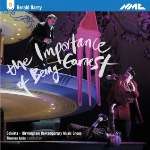|
Back
02/15/2015
Gerald Barry: The Importance of Being Earnest
Barbara Hannigan (Cecily Cardew), Katalin Karolyi (Gwendolen Fairfax), Hilary Summers (Miss Prism), Joshua Bloom (Algernon Moncrieff), Peter Tantsits (Jack Worthing), Alan Ewing (Lady Bracknell), Joshua Hart (Dr. Chasuble), Benjamin Bevan (Lane/Merriman)
Birmingham Contemporary Music Group, Thomas Adès (conductor)
Recorded live at the Barbican Hall, London (26 April 2012) – 79'49
NMC D197 – Notes and libretto in English

   
Oscar Wilde’s 1895 play treats light-heartedly - even mischievously - with big serious issues of the day: namely courtship, inheritance, legitimacy and respectability. In 2010 another Irishman, Gerald Barry, streamlined the play to about one-third length and set it to music - arguably mischievously as well, since the music style is based mainly on the Schoenbergian 12-tone system, the type of music least likely to support, let alone conjure up, comedy.
In 1974, midway between the play and the opera, Tom Stoppard’s play Travesties concerned itself with (among many things) a production of Wilde’s play that occurred in Zurich in 1917. Two characters from the Wilde work (Gwendolen and Cecily) engage in a period music hall banter song, but also in Travesties appears the historical character of Tristan Tzara, the founder of the Dada movement. When working on his Earnest treatment I don’t know if composer Barry was actually thinking about Dada (although he published a composition in 1979 titled ‘__________’ which certainly seems fully Dadaist), but his piece seems to be infused with its spirit as the characters engage in rapid-fire exchanges of Wilde’s pared-down lines while the 21-member orchestra (heavy on the brass and winds) lurches and blats its way through the score.
Other Dada moments: when Gwendolyn and Cecily meet each other and have tea, they sing into megaphones, giving their voices a tinny, far-off quality. At separate points both Lady Bracknell and Miss Prism unaccountably break into a version of Schiller’s Ode to Joy (but not Beethoven’s tune). Also Lady Bracknell suddenly starts speaking German to Cecily (a translation of some of Wilde’s lines) delivered in a Hitlerian rant. Twice the orchestra players voice some lines along with the singers.
The fact that Lady Bracknell is performed by a bass (Alan Ewing) isn’t all that way-out as there have been many productions of the play with the character played by a man. And Barry hasn’t deconstructed the play; his version follows the plot and contains an abrupt but legible précis of each scene.
Given the musical style of declamation (utterly unlike bel canto) it is hard to gauge just how well each performer does. The basic technique is a speedy pitched chanting with random moments of falsetto. There are oddly-placed pauses, as in “You have always told it was (pause) Ernest.” Barbara Hannigan utters most of Cecily’s lines in an ultra-high steam whistle fashion (much like Ariel in Thomas Adès’ The Tempest). The others are reasonably comprehensible.
The composer himself plays offstage piano at the start (when it supposed to be Algernon playing) - what we hear is a drunken version of "Auld lang syne". One must assume that conductor Thomas Adès has done a satisfactory job.
Since it is a live performance there is occasional audience laughter, although not as much as at a normal performance of the play. Perhaps some laughter was edited out to fit the recording on to a single CD. The three acts last barely 80 minutes and frankly one is glad it isn’t longer.
I realize I have probably convinced most readers that they would rather poke sharp sticks in their ears than listen to this, but strangely enough I would be curious to see a staged performance. A strictly audio performance minus the visuals is not the most advantageous presentation for a work whose composer makes no attempt to beguile. As far as I can tell the work has received three full stagings (in Nancy, France, at Covent Garden’s Linbury Studio, and in Ireland) plus concert performances in Los Angeles (where the LA Philharmonic was co-commissioner) and the one recorded. I don’t think it deserves to be called popular but it has achieved a bit of a track record.
Michael Johnson
|